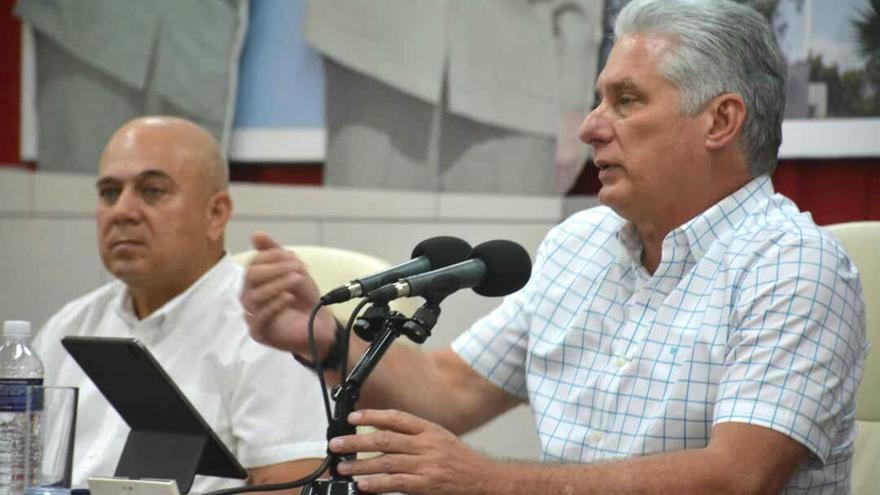
![]() 14ymedio, Havana, April 15, 2023 — Miguel Díaz-Canel found this Friday a new scapegoat this Friday to justify the fuel crisis in Cuba. “What happened to gasoline?” was the question that was asked in a confessional tone during a meeting with leaders of the Communist Party in Villa Clara. “The countries that have certain commitments to supply us with gasoline are also experiencing a complex energy situation,” he concluded.
14ymedio, Havana, April 15, 2023 — Miguel Díaz-Canel found this Friday a new scapegoat this Friday to justify the fuel crisis in Cuba. “What happened to gasoline?” was the question that was asked in a confessional tone during a meeting with leaders of the Communist Party in Villa Clara. “The countries that have certain commitments to supply us with gasoline are also experiencing a complex energy situation,” he concluded.
The “non-compliances” of others — which seems to point, above all, to Venezuela — can be translated into figures: “From between 500 and 600 tons of gasoline per day that the country consumes, at the moment we have coverage of less than 400,” he calculated. In addition, the Government “is not very clear” about how it is going to “get out of the situation.”
After recognizing that there was no clear and long-term strategy to address the problem, he suggested that the best thing was to be resigned to it: “This does not have to do with inefficiencies of the country or with problems of our energy institutions, but with non-compliances that have also occurred for very objective reasons that the countries that supply us have,” he said, without going into details about the problems faced by Venezuela.
Regarding diesel, he assured that the cause of its deficit was “different,” and that it could be attributed to “temporary problems.” “The loading was guaranteed, but the ship broke down in Santiago de Cuba, and this prevented the unloading in time for it to continue to other ports. That has caused a delay in the way we have been able to distribute that fuel,” he explained, without specifying if he was talking about the oil tanker Nolan, which was loading 1.53 million barrels (400,000 barrels of fuel oil and 13.13 of diesel) destined for Cuba.
He also referred to the “strategy to avoid blackouts in the summer,” since most of the Island’s thermoelectric plants are “resolving breakdowns or under maintenance.” “We have had to depend more on distributed electricity generation, which usually consumes diesel,” he said.
The official press welcomed Díaz-Canel’s visit to Santa Clara, the city that nominated him for the new legislature of the Cuban Parliament and in which he carried out a sustained campaign during last March’s elections. Cubadebate admitted that the president arrived in the center of Cuba “in the midst of a complex energy situation, which has generated a lot of concern in the population,” and celebrated Díaz-Canel’s contrition in the face of the successive crises that “complicate the lives of Cubans.” In addition, it applauded his criticisms of “the deficiencies of the Party’s work in Villa Clara” and that he himself performed a “self-criticism.”
Despite Díaz-Canel’s “resignation,” the fuel crisis continues to worsen as the summer arrives. The imminence of the hottest months augurs a reoccurrence of the long blackouts that only gave Cubans a truce in December 2022, but that regained strength in January of this year.
So far, the most serious symptom is manifested in transport, since a large part of the Island’s vehicles are paralyzed or must face long lines in front of gas stations and are also required to have accreditation that they belong to an authorized ministry, company or to embassies.
However, data published by Reuters reveal that Cuba receives a constant supply of fuel. In March, Cuba received 980,000 barrels of oil from Russia, Panama and Uruguay, another sign of the increasing economic ties between the Kremlin and Havana.
The new rules of rationing at gas stations show that this supply rarely benefits Cuban drivers, and that despite the failures of the last harvest, Russia seems determined to reactivate sugar production on the Island and other agricultural activities by sending its oil to the country.
In addition to Moscow, Havana has its oil partner par excellence in Caracas. Several agreements, which a recent visit by Raúl Castro to the Venezuelan capital was in charge of reactivating, guarantee that the Island is the port of arrival for numerous oil tankers from Venezuela.
To this panorama is added the traffic of the patanas along the Cuban coast, the floating generators sent by Turkey to alleviate the energy deficit on the Island. The Erin Sultan left Havana on Tuesday for Santiago de Cuba and should arrive this Saturday to replace the Irem Sultan, which arrived in the capital of the East less than a month ago.
Meanwhile, other ships of the Karadeniz Powership company, the Suheyla Sultan and a small tugboat, are still anchored in the Bay of Havana. The most evident sign of Cuba’s energy instability is the blackouts that Cubans are already suffering, and that their duration is increasing.
Translated by Regina Anavy
____________
COLLABORATE WITH OUR WORK: The 14ymedio team is committed to practicing serious journalism that reflects Cuba’s reality in all its depth. Thank you for joining us on this long journey. We invite you to continue supporting us by becoming a member of 14ymedio now. Together we can continue transforming journalism in Cuba.
